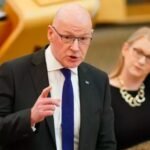Ross praises Forbes and hints at SNP dissent
Douglas Ross, the leader of the Scottish Conservatives, has made some surprising remarks about Kate Forbes, the SNP finance minister, at the Tory party conference in Manchester. He praised Forbes for raising “serious concerns” about the SNP leadership and the direction of the Scottish Government. He also suggested that some SNP backbenchers have spoken to him about ways to hold the government accountable.
Ross did not name any of the MSPs who allegedly contacted him, but he singled out Forbes as an example of a competent and critical SNP member. He said: “Kate Forbes and others… have raised serious concerns about the SNP leadership and the direction of this Scottish Government.”
Forbes hits back at Ross on Twitter
Forbes, who has been critical of some Scottish Government policies, such as the scrapped plans for Highly Protected Marine Areas, did not appreciate Ross’s comments. She took to Twitter to hit back at him, calling him “Douglas ‘three jobs’ Ross” and accusing him of spending little time in the Scottish Parliament or speaking to his own party colleagues.

She wrote: “Which is only one of the many, many reasons why I’ve never said more than a passion hello to him since he was elected. Conference hyperbole compensating for a failed Tory Gov.”
Forbes also reaffirmed her loyalty to the SNP and the First Minister, Nicola Sturgeon, saying: “I’m proud to be part of a strong SNP team, led by Nicola Sturgeon, delivering for Scotland.”
Ross calls for a vote to end the Bute House Agreement
Ross also used his speech at the conference to attack the Bute House Agreement, the deal between the SNP and the Scottish Greens that gave the latter two ministerial posts and a shared policy agenda. He said the agreement was a “threat to the Union” and a “sell-out” to the “extreme Greens”.
He said: “I’ve made it very clear, if I can see there is an opportunity to have a vote in the Scottish Parliament to end the Bute House Agreement, then I hope some of those dissenting voices in the SNP would get behind that and vote the Greens out of office.”
He added that his party would provide a space for anyone who wanted to end the agreement and stand up for the interests of Scotland.
SNP and Greens dismiss Ross’s claims
The SNP and the Greens have dismissed Ross’s claims as “desperate” and “delusional”. They said the Bute House Agreement was a positive and progressive partnership that would deliver on the priorities of the Scottish people, such as tackling the climate crisis, recovering from the pandemic, and securing a second independence referendum.
A spokesperson for the SNP said: “Douglas Ross is clearly rattled by the strength and stability of the SNP-Green co-operation agreement, which has left him and his Tory colleagues isolated and irrelevant in Scottish politics.”
A spokesperson for the Scottish Greens said: “Douglas Ross is living in a fantasy world if he thinks there are any SNP MSPs who would side with him over the co-operation agreement. The agreement is popular with the public and has a clear mandate from the voters.”
What will happen next?
The Bute House Agreement is likely to face more challenges and scrutiny from the opposition parties, especially the Tories, who see it as a threat to their agenda and influence. However, it is unlikely that the agreement will be overturned by a vote in the Scottish Parliament, as the SNP and the Greens have a combined majority of 71 seats out of 129.
The agreement will also have to navigate the complex and contentious issues of the independence referendum, the climate emergency, and the post-Brexit relationship with the UK and the EU. The success or failure of the agreement will depend on how well the two parties can work together and deliver on their promises.


















